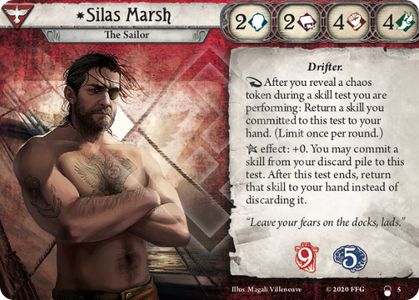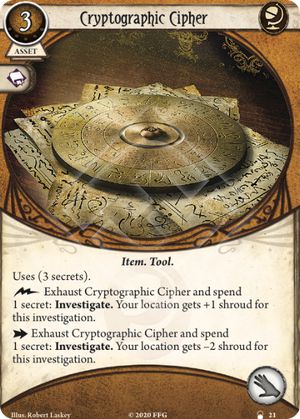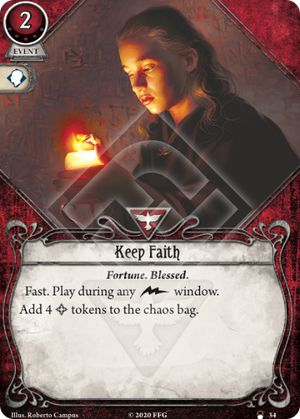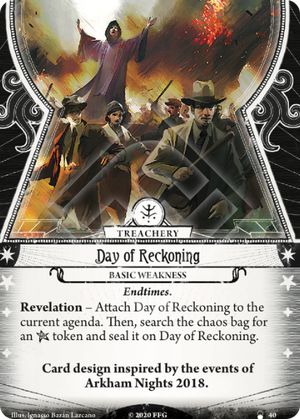
For those of you who like me were looking for a review of Silas Marsh, I've copied and pasted Tsuruki23's excellent write up of him from his Book Card Page since it is no longer available. The Card Links and symbols are broken and there is no mention of his standard signatures since I pulled this from the cached page, but this will do until an updated review is put out there. All credit goes to Tsuruki23 for the following:
(Update 5/1/2019 (Forgotten age complete), new cards).
Silas Marsh is here and he is rocking the boat of how the game is played!
TLDR: Get your Fire Axe and your Dark Horse, load up on skill cards, and brute force through every skill that comes your way. Make sure to bring a lot of skill cards that draw cards to keep your hand cycling and full. Don't be afraid to spend an early-round to load up your hand. As you level up grab Key of Ys and your choice of upgraded weapons.
.
Now the long version.
Silas Marsh is more flexible than he first seems. The and values combine to ensure that you can have a LOT of control over combat encounters. You can leisurely evade and neutralize the threat a retaliating foe poses until you're ready to kill it. Obviously, Silas Marsh has a good fighting baseline but for investigation and treachery defense he is completely reliant on cards.
.
So, what cards do you use?
Because of the low you really must make sure you load up on as much horror defense as you can muster, especially since he's only got 5 Sanity. Cherished Keepsake and/or solid tanky allies like Madame Labranche, Peter Sylvestre are absolutely necessary. Although you can make use of Yaotl you need to get to grips with the fact that your allies will be taking the brunt of your horror damage, therefore don't get too attached. Obviously, you will be taking Guts and give serious consideration to a copy or two of Say Your Prayers.
The is a great challenge for Silas Marsh, Flashlight is the classic solution, a solution that integrates very nicely with "Look what I found!" to create a 1 - 2 punch that deals with both low and high difficulty locations. Silas Marsh's ability syncs with Perception and even Desperate Search to stubbornly pry up a couple more clues. With these cards in your deck, you're all but guaranteed to pull up half a dozen clues, often more, but you're at the mercy of the draw-gods. (If you really want to give it your all in the clue game then grab Winging It too but not at the cost of an important skill slot!)
The and skills both let you deal with threats. There's no Lockpicks, no Evidence!, no nothing in the investigator cardpool that lets you turn these skills into clues, these stats are for fighting only! Sadly your weapon options at 0xp are severely limited, Knife and Baseball Bat will trash themselves long before you kill your way through all the threats you need to kill, Kukri is too damn slow and so is Gravedigger's Shovel, that leaves just Fire Axe. Thankfully Fire Axe works beautifully with alongside Flashlight or Newspaper.
The limits of Silas Marsh's cardpool sorta shoehorn him into a Fire Axe + Dark Horse build if he intends to kill things with , but don't forget that you can drastically increase the longevity of a Knife or Baseball Bat by dealing with some enemies via cards like Close Call and Waylay, they become much more reliable with Live and Learn, or save their use just by running away. Obviously, Peter Sylvestre is a great addition if you intend to run circles around your enemies rather then fighting them, keep in mind however that you cannot run a fully loaded lineup of events and assets if you want a properly loaded assortment of skills.
.
The dearth of suitable weapons means Fire Axe + Dark Horse is the way to go for an effective 0xp deck, things really liven up with some XP however because the new cards Ornate Bow, Old Hunting Rifle, and Timeworn Brand are all great choices for Silas. Brand, in particular, costing 5 XP, slots seamlessly into your deck and skyrockets your combat potential without blocking space for a flashlight. Old Hunting Rifle supplements the Brand/Ornate Bow as a good 3rd and/or 4th weapon to increase the odds of getting an armament early. If you go for Bow + Rifle then make sure to also bring Quick Thinking and Live and Learn to earn back some of the time spent reloading and to re-use missed shots.
.
Lets talk skill cards, this will be the bulk of a Silas Marsh deck and the bulk of his shtick. 10 Skills in your deck is the absolute minimum and there need to be draw mechanics in your deck to fill your hand and keep it stuffed. You can really go crazy with the skills and have as many as 14 or 16 of them. Silas Marsh's ability is a bit like a reverse Lucky!, you can commit a skill card and then pull it back if you would fail OR if you would succeed enough to make the card commitment a waste. Did you just commit a Reckless Assault and draw a "0" token? Just pick it back up and use it on the next attack! Because of Silas's dependence on skill cards it can be hard to upgrade his deck, thankfully he scales really well with Key of Ys, The Red-Gloved Man and the new and XP intensive weapons, that gives you access to a couple of really powerful, condensed, cards that don't dig into your skill-pool.
I highly recommend that you spend an early round to draw and load up on skill cards, this has an effect like loading a gun before a fight, you're much more prepared to deal with the scenario with 8 cards worth of skill icons in your hand, with this character in particular overdraw is pretty much a good thing!
-> For Silas Marsh drawing cards is the equivalent to playing assets <- Due to the way a Silas Marsh interacts with his skill cards, drawing cards is nearly the same as setting up and playing assets, you know those times when a needs to just stop for a moment to get some cash and play some guns, this is what a Silas Marsh is doing when he stops to fill his hand.
The classic Guts, Manual Dexterity, Overpower and Perception will go a long way to generating most of, if not all, the card draw you need. Use the Investigator ability to ensure that these cards don't get over-committed or lost on failed checks. Unexpected Courage more than makes up for it's lack of draw with flexibility, it's nearly an auto-include in a Silas deck.
Consider including Eureka! or cutting Perception or Manual Dexterity for it, the slightly broadened draw window helps fish out your Nautical Prowess or weapon or something like Key of Ys or The Red-Gloved Man down the line.
On standard you can try Quick Thinking, the extra action is a powerfull tool but on Hard it gets just a bit too hard to trigger and eats your ability trigger round-after-round. You might reconsider it if you decide to play with Fight or Flight, through the duration of which you will very likely be able to trigger the extra action. Having a quick thinking in your deck can turn draws into absolutely crazy value, therefore a 1-off isn't a bad idea.
Another card of note is Defiance, it is extremely powerful with Silas Marsh's ability. The "token blanking" effect takes place when the card is committed, this means that when you commit it and draw the targeted token the token is treated as having a "0" modifier even if you pull back the Defiance with the investigator ability. You will spend a good deal of your ability triggers to juggle this card until it finally gets "used" for the sake of the +1 skill bonus.
Obviously Resourceful is good even if just to grab Lucky!, eventually you'll start getting higher level cards like True Survivor, Will to Survive and the like and these are great targets for recursion. Resourceful is a terrific target for triggers since it causes "chain" recursion when you pick and return a second card.
True Understanding is innate and that makes it a point of interest for Silas, the text means that you can use it during the resolution of treachery cards and unique printed abilities on enemies and locations, beating these tests can be tricky for Silas but the free-clue is a tremendous effect to get for an challenged character.
Take Heart is a good alternative to Rabbit's Foot or other forms of card draw for Silas Marsh. You can actually play Take Heart on tests you're sure to succeed on, if you succeed as expected then just pick Take Heart back up.
All the desperate cards (Reckless Assault, Desperate Search ETC) are good for Silas, just don't overdose on them or you'll find them clogging your hand early in a scenario, 4 Desperate cards seems to be the absolute maximum. I've taken the habit of bringing a single copy of Say Your Prayers in many decks as a stopgap desperation defense against Frozen in Fear and Rotting Remains, I highly recommend this for Silas.
The majority of the other specialized skills, Inspiring Presence and Inquiring Mind for example aren't really worth the effort, they provide powerful niche effects and experiences will vary between decks and people, but generally speaking generic skill cards will yield the same or better benefits.
.
As for strengths and weaknesses, Nautical Prowess is an INSANE card, much like Defiance you will be juggling this thing a lot. The wording means that you can wait until the token is revealed before you pick the extra skill icons or the free card, if it suits you you can then pick the card up after the reveal to effectively net a free card draw and still have Nautical Prowess in your hand to be used again, don't be afraid to play this supplementally with other skill cards to basically turn one test per turn into an extra card-draw, you'll be sad when the moment finally arrives where you gotta part with Nautical Prowess for the sake of beating a test.
Perhaps to make up for Silas Marsh's weak deckbuilding options his weakness is suitably weak as well, Dreams of the Deep is very unlikely to deal you much damage if there's an enemy around to evade or punch and even if you take 2 or 4 points of damage the odds that you'll die from damage rather then horror are low at best anyway. Play it alongside a Reckless Assault, a maxed Fire Axe attack or in a Fight or Flight window to all but guarantee that this card goes POOF.
Silas's is a delightful thing to trigger, use it to regain your Nautical Prowess if you can! Don't forget that you cannot commit a card to a test if it doesn't have suitable icons, this means that you can't grab a Overpower during an test and can't grab Desperate Search on a check and-so-on.
.
Final mention, Try and Try Again and True Survivor are obvious power-cards for Silas. You can double up on Try and Try Again and basically have free reign on your investigator ability for rounds on end and/or grab a copy or two of True Survivor (I find one copy to be enough since the card has terrible tempo and can be recursed via Resourceful) to reload your hand and regain Nautical Prowess. Don't bother with the unlimited version of Try and Try Again.
.
Silas Marsh is a capable investigator, he is very similar to Wendy Adams in the way that he interacts with the cards in his hand and excels at beating key tests by cheesing them with his skills and/or Lucky!. He used to suffer a bit in his lack of combat options but the last 3 packs in the Forgotten age all had neutral or weapons that really broadened his horizons.




